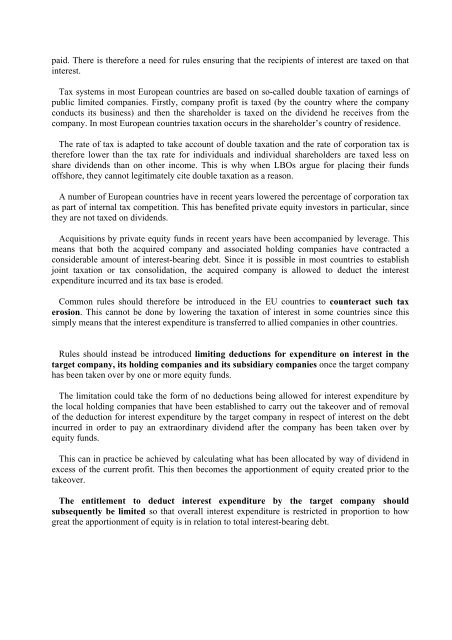Executive summary - Udo Bullmann
Executive summary - Udo Bullmann
Executive summary - Udo Bullmann
- No tags were found...
Create successful ePaper yourself
Turn your PDF publications into a flip-book with our unique Google optimized e-Paper software.
paid. There is therefore a need for rules ensuring that the recipients of interest are taxed on thatinterest.Tax systems in most European countries are based on so-called double taxation of earnings ofpublic limited companies. Firstly, company profit is taxed (by the country where the companyconducts its business) and then the shareholder is taxed on the dividend he receives from thecompany. In most European countries taxation occurs in the shareholder’s country of residence.The rate of tax is adapted to take account of double taxation and the rate of corporation tax istherefore lower than the tax rate for individuals and individual shareholders are taxed less onshare dividends than on other income. This is why when LBOs argue for placing their fundsoffshore, they cannot legitimately cite double taxation as a reason.A number of European countries have in recent years lowered the percentage of corporation taxas part of internal tax competition. This has benefited private equity investors in particular, sincethey are not taxed on dividends.Acquisitions by private equity funds in recent years have been accompanied by leverage. Thismeans that both the acquired company and associated holding companies have contracted aconsiderable amount of interest-bearing debt. Since it is possible in most countries to establishjoint taxation or tax consolidation, the acquired company is allowed to deduct the interestexpenditure incurred and its tax base is eroded.Common rules should therefore be introduced in the EU countries to counteract such taxerosion. This cannot be done by lowering the taxation of interest in some countries since thissimply means that the interest expenditure is transferred to allied companies in other countries.Rules should instead be introduced limiting deductions for expenditure on interest in thetarget company, its holding companies and its subsidiary companies once the target companyhas been taken over by one or more equity funds.The limitation could take the form of no deductions being allowed for interest expenditure bythe local holding companies that have been established to carry out the takeover and of removalof the deduction for interest expenditure by the target company in respect of interest on the debtincurred in order to pay an extraordinary dividend after the company has been taken over byequity funds.This can in practice be achieved by calculating what has been allocated by way of dividend inexcess of the current profit. This then becomes the apportionment of equity created prior to thetakeover.The entitlement to deduct interest expenditure by the target company shouldsubsequently be limited so that overall interest expenditure is restricted in proportion to howgreat the apportionment of equity is in relation to total interest-bearing debt.





